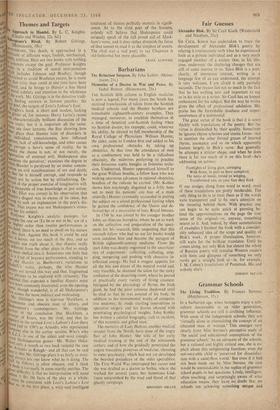Barbarians
THE Scottish fifth column in English medicine is now a legend. For many years the South has received transfusions of talent from the Scottish medical schools and the Hunter brothers are remarkable eighteenth-century examples. They managed, moreover, to establish themselves at a time of fanatical anti-Scottish feeling when no Scottish doctor, for example, could, whatever his ability, be elected to full membership of the Royal College of Physicians. William Hunter, the elder, came to London first and added to his own professional obstacles by taking up obstetrics. At that time the attendance of men at a confinement was held to be a ridiculous obscenity, the midwives preferring to practise their ferocious septic bungles in feminine seclu- sion. Undeterred, Hunter apprenticed himself to the great William Smellie, a fellow Scot who was making enormous advances in rational obstetrics, heedless of the ridicule he excited. (Mr. Kobler shows him touchingly disguised in a frilly bon- net to meet his patients' coy.. fear of a male midwife.) Hunter eventually succeeded in putting the subject on a sound professional footing when he gained the confidence of the Queen and de- livered her of a succession of lusty Royal fonuses.
In 1748 he was joined by his younger brother John, an illiterate bumpkin, whom he set to work on the collection and preparation of the speci- mens for his research, little suspecting that this uncouth fellow who had no use for books would soon outshine him and become the paragon of British eighteenth-century medicine. From the start John was deeply engrossed in the uncertain- ties of experiment: collecting, collating, snip- ping, tampering and probing with obsessive in- tellectual energy. He had a magpie appetite for all the bits and pieces of the natural world and, very irascible, he shunned the salon for the reeky confusion of the dissecting room, where he peered at practically every variety of living creature. Intrigued by the physiology of Byrne, the Irish giant, he had the poor colossus shadowed until he died so that he was assured of his body. In addition to his monumental works of compara- tive anatomy, he made startling innovations in operative surgery and his diaries abound with penetrating psychological insights. John Kobler has written a careful biography, rich in incident, of this eccentric and gifted man.
'The memoirs of Lady Hutton, another medical invader from the North, have none of the angry flair of John Hunter. She tells of her early medical training at the end of the nineteenth century and of how she gradually penetrated the august masculine preserves of medicine, choosing to enter psychiatry, which had not yet developed the bearded prejudices of the older specialities.
The First World War interrupted her career and she was drafted as a doctor to Serbia, where she worked for several years, her humorous kind- liness untarnished by the mud and blood of that ghastly campaign.
JONATHAN MILLER


























 Previous page
Previous page